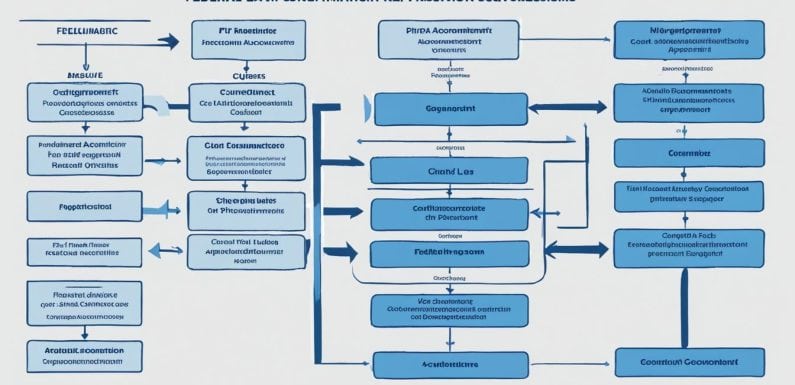
Federal law in the United States mandates stringent regulations and clear-cut responsibilities for departmental accountable officials. At the heart of this legislation is the principle of ensuring that government funds and resources are managed with the highest degree of integrity and accountability. These officials bear the critical task of maintaining transparency across various government departments, playing a fundamental role in the stewardship of public assets.
The intricacies of federal law provide a framework that not only defines the roles of departmental accountable officials but also outlines the expectations and standards to which they must adhere. Emphasizing the safeguarding of public trust, these regulations establish a robust architecture for fiscal management that these officials are obliged to uphold.
Key Takeaways
- Federal law delineates specific regulations for departmental accountable officials to promote fiscal accountability.
- The role of these officials is central to the management and protection of government funds and resources.
- Responsibilities of departmental accountable officials include adhering to legislative frameworks and ensuring transparency.
- Accountable officials are crucial for upholding the integrity of financial operations within government departments.
- Federal regulations serve as a guide for monitoring and enforcing compliance with accountability standards.
Federal Legislation Governing Departmental Accountable Officials
The fabric of fiscal management within the United States government is reinforced by robust federal legislation that delineates the framework within which departmental accountable officials must operate. These statues not only define the scope of accountability but also outline the duties and liabilities of those entrusted with the stewardship of public funds.
Designation and Duties of Departmental Accountable Officials
Departmental accountable officials hold pivotal roles under federal guidelines, ensuring that resources are managed with integrity and efficiency. Their roles are multi-faceted, extending from overseeing expenditures to ensuring adherence to policies that safeguard the nation’s fiscal interests.
- Appointment and qualifications of officials
- Supervision of financial operations and reporting
- Compliance with established governmental regulations
Pecuniary Liability and Accountability Measures
The threat of pecuniary liability serves as a deterrent to negligence or mismanagement. This section will cover the statutes concerning the accountability of financial stewards for losses incurred through fraud, waste, or misappropriation of funds.
- Assessment of financial risks and liabilities
- Recovery processes for losses sustained
- Disciplinary actions for breach of fiduciary duties
Implications for Local Nationals Employed Abroad
Local nationals employed in various government departments abroad are not exempt from the tentacles of U.S. federal legislation. This segment examines how the standards and requirements imposed on domestic officials extend to their foreign counterparts.
| Aspect | Domestic Accountability | Accountability Abroad |
|---|---|---|
| Fiscal Oversight | Mandatory | Mandatory with local adaptations |
| Legislative Compliance | Strict adherence to U.S. law | Adherence to U.S. law, considering international treaties |
| Financial Reporting | Standardized federal reporting | Culturally adapted reporting mechanisms |
What Does Federal Law Say About Departmental Accountable Officials?
Understanding the intricate framework of federal law as it pertains to departmental accountable officials is crucial for maintaining transparency and responsibility in fiscal management. The following details will dissect the various components of these laws, from designation to their implications for individuals both domestically and abroad.

Designation and Duties of Departmental Accountable Officials
Within the scope of federal law, departmental accountable officials are designated based on stringent criteria that ensure the individuals occupying these positions are both competent and trustworthy. Their responsibilities span across the stewardship of public funds, maintaining accurate financial records, and ensuring that all financial activities are in compliance with regulations. These duties are not taken lightly, as they form the bedrock of governmental accountability and integrity.
Pecuniary Liability and Accountability Measures
Federal law does not shy away from imposing pecuniary liability upon departmental accountable officials for fiscal irregularities. This serves not only as a deterrent but also as a mechanism for recourse in the event of financial mismanagement. Rigorous accountability measures are in place which includes regular audits, mandatory reporting structures, and, if necessary, penal provisions that hold these officials legally answerable for any dereliction of duty.
Implications for Local Nationals Employed Abroad
The ramifications of federal law extend beyond the borders of the United States, particularly impacting local nationals employed in U.S. government departments abroad. These employees are subject to the same legal frameworks and accountability standards as their domestic counterparts, ensuring the integrity of financial operations is upheld regardless of geographical location. This parity is crucial for the uniform enforcement of fiscal responsibilities and serves to protect the interests of the U.S. government on a global scale.
| Aspect | Designation and Duties | Pecuniary Liability | Global Implications |
|---|---|---|---|
| Criteria | Competence, trustworthiness, ability to manage funds | Risk of financial discrepancies | Uniform accountability globally |
| Responsibilities | Financial stewardship, record-keeping, regulatory compliance | Personal financial accountability for mismanagement | Adherence to federal law by local nationals abroad |
| Accountability Measures | Audits, reporting structures | Legal recourse, penalties | Consistent enforcement, protection of U.S. interests |
Policy Development and Enforcement for Accountable Officials
The integrity of a government’s financial management system largely hinges on the robustness of its policy development protocols, particularly as they pertain to accountable officials within government departments. To maintain this structural integrity, it is essential that policy frameworks are meticulously crafted and aligned with federal regulations. These policies must clearly delineate the roles and responsibilities of accountable officials to establish a baseline for efficiency and ethical conduct. Such clarity ensures that these individuals are well-informed of their duties, including fiscal management, resource allocation, and maintaining transparency in all transactions.
Enforcement mechanisms serve as crucial complements to policy formulation. Without effective enforcement, even the most comprehensive policies would be rendered ineffectual. Therefore, government entities invest significant resources to support a compliance infrastructure that monitors, evaluates, and reinforces adherence to policies by accountable officials. This infrastructure includes regular audits, mandatory training sessions, and a hierarchy of accountability that stretches from individual contributors to the highest echelons of the departmental leadership. Through these measures, government departments strive to prevent mismanagement of funds, identify any discrepancies swiftly, and remediate them in compliance with federal law.
To conclude, the symbiotic relationship between policy development and enforcement is the backbone that supports the ethical and efficient functioning of accountable officials. As gatekeepers of the public trust, these officials must navigate a complex landscape where every decision must stand up to stringent regulatory standards. Understanding the weight of this responsibility, government departments continually evolve their policies and enforcement strategies to ensure that accountable officials are equipped not just with the authority, but also with the guidance necessary to uphold the financial integrity of the institutions they serve.
